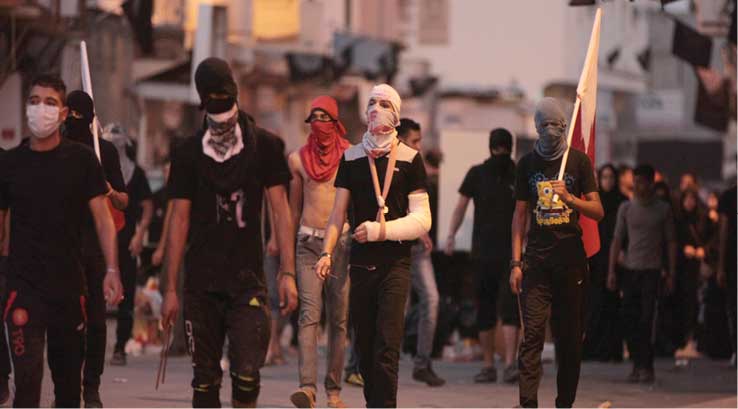
In 2016, we submitted to the UN Mechanisms 8 communications regarding 5 individuals.

BAHRAIN
 Our Concerns
Our Concerns
- Continued repression and systematic harassment of all dissenting voices;
- Practice of torture and impunity for the security services;
- Excessive use of force to disperse peaceful demonstrations and public gatherings.
 Recommendations
Recommendations
- Put a definitive end to the crackdown on political activists and release all those arbitrarily detained;
- Put an end to the practice of torture and ensure that all allegations of torture are subjected to independent and impartial investigations;
- Stop the excessive use of force against peaceful demonstrators;
- Amend the 2006 Anti-Terrorism Law to ensure it is in conformity with international human rights standards and review all convictions handed down under this legislation.
 Upcoming
Upcoming
- April-May 2017: Review of Bahrain by the Committee against Torture;
- 1 May 2017: Third Universal Periodic Review of Bahrain before the Human Rights Council.
Five years on, Bahrain is yet to emerge from the political crisis into which the country plunged in 2011. The process of national reconciliation remains blocked and has proven increasingly problematic given Bahrain’s participation in the Saudi-led coalition against Houthi rebels in Yemen, which has contributed significantly to a further polarisation of society.
This year again, the confessional division remained at the heart of many issues and political fractures in the country. On 30 May 2016, the Bahraini Court of Appeal upheld the conviction of Sheikh Ali Salman, the Secretary General of Al Wefaq – the country’s main Shia opposition party – and increased his prison sentence from four to nine years on charges of “incitement against the government”. In June, his party was suspended; accused of creating “an environment for terrorism, extremism and violence”, the High Administrative Court of Bahrain later pronounced its dissolution.
In 2016, human rights violations have been on the rise and the political repression against the opposition continued to result in abusive arrests, travel bans, and deprivation of nationality. Peaceful protests, which continued to be held despite the 2013 law prohibiting public gatherings in the capital Manama, were severely repressed, with security forces often resorting to a disproportionate use of force.
Furthermore, in May 2016, the National Institution for Human Rights of Bahrain (NIHR) was reviewed by the Sub-Committee on Accreditation (SCA) of the Global Alliance of National Human Rights Institutions, which accredited the NIHR with the “B” status, reflecting its non-compliance with the Paris Principles. In January 2016, Alkarama had submitted a report to the SCA underlining the NIHR’s lack of independence and transparency.

The continued crackdown on civil society and political opposition
The crackdown on civil society and political opposition has become an institutionalised practice in Bahrain. This year again, measures of repression against the opposition have resulted in abusive arrests followed by arbitrary detentions, travel bans, and deprivation of nationality. Attacks on fundamental human rights are on the rise, ranging from assaults on the freedom of expression and of peaceful assembly to denying detainees their legal safeguards and subjecting them to torture.
The oppressive nature of the 2006 Anti-Terrorism Law continued to limit these fundamental freedoms and to threaten peaceful activists, human rights defenders, and members of the opposition. Many have been prosecuted for “criticising” the government on social media or during public gatherings, while the authorities continue to detain prisoners of conscience, convicted following unfair trials. The lack of independence of the judiciary leads to unfair trials of human rights defenders and members of the opposition.
Over the span of only a few months, the authorities increased their crackdown on the freedom of expression and of peaceful assembly, arresting numerous activists, journalists, and other prominent figures in the process. In February 2016, after being detained incommunicado and tortured, the photojournalist Ahmed Jaber Al Fardan was sentenced to three months in prison, merely for covering a local protest that took place in 2013. He was charged with “attempting to attend an illegal gathering”.
On 14 June 2016, under the pretext of the necessity to “protect society and combat extremism”, Al Wefaq was suspended and its assets were frozen. This decision came just two weeks after the party’s Secretary General’s sentence was increased from four to nine years in prison. The Bahraini judiciary found him guilty of “inciting the promotion of the change of the political system by force, threats and other illegal means”, “publicly insulting the Interior Ministry”, and “publicly inciting others to disobey the law”. On 17 July 2016, the High Administrative Court of Bahrain pronounced the dissolution of Al Wefaq for “serious violations of the Constitution and national laws”, including creating “an environment for terrorism, extremism and violence”, “conducting of activities detrimental to the civil peace and unity”, and “incitement to non-compliance with institutions”.

Torture: a persistent practice
Despite Bahrain’s ratification of the Convention against Torture (UNCAT) in 1998, torture remains a persistent practice in the country and is used as a tool of repression. In 2016, cases documented by Alkarama have shown once more that the authorities use torture to obtain confessions, which are subsequently admitted during trials and relied upon as the sole evidence to sentence the accused. Acts of torture are committed by law enforcement officials falling under the authority of the Ministry of Interior with complete impunity, and perpetrated against people charged under the 2006 Anti-Terrorism Law in particular.
In 2016, the authorities continued to deny the existence of such practices, stating that torture is prohibited under the Constitution and punishable by law, and that Bahrain is meeting international standards in this regard. While Bahrain agreed, in 2011, to amend its legislation and introduce a definition of torture that is in conformity with the UNCAT and criminalises all acts of torture and ill-treatment, the clear and unequivocal prohibition of this practice still fails to appear in any Bahraini law.
Moreover, while the authorities have consistently claimed that they did not oppose peaceful demonstrations, various human rights organisations have reported an excessive use of force by authorities to repress protests. In this respect, Alkarama documented the case of two under-aged brothers, Fadel and Bassel Jayed, who were tortured in detention and forced to sign statements confessing to the charge of “illegal gathering”, a charge regularly used to repress the right to freedom of peaceful assembly and prosecute individuals for taking part in demonstrations.
This year again, Bahrain failed to set a date for the visit of the Special Rapporteur on torture and other cruel, inhuman or degrading treatment. After cancelling visits scheduled for 2012 and 2013, the government continues to postpone the deadline, officially citing an “inability to fix a date”.

BAHRAIN’S UPCOMING UNIVERSAL PERIODIC REVIEW
On 22 September 2016, in view of Bahrain’s third Universal Periodic Review (UPR), which will be held on 1 May 2017, Alkarama submitted its report on Bahrain’s human rights situation to the Human Rights Council (HRC). The UPR involves a review of the human rights record of all UN Member States by the HRC every four years. The review encompasses an interactive discussion between the State under review and other UN Member States. In support of this process, NGOs can submit information, which can be referred to by any of the States taking part in the interactive discussion.
In its report, Alkarama underscored the most serious and persistent human rights violations in the country, including the use of torture, the recourse to arbitrary detention, and the violations of fair trial rights. Alkarama also expressed concern about the repression exercised against the opposition and underlined the oppressive nature of the 2006 Anti-Terrorism Law, which continues to limit and threaten the fundamental freedoms of peaceful activists, human rights defenders, and members of the opposition.
In addition, Alkarama denounced the practice of arbitrary detention to silence peaceful dissidents and human rights defenders. It noted that arrests, particularly those of peaceful protestors, were often carried out by members of the police or National Security Special Forces, with an excessive use of force. Such practices go hand in hand with the violation of the right to a fair trial. Indeed, secret detention, the denial of access to a lawyer before the trial to prepare the defence, and the use of confessions obtained under torture all constitute major flaws that are characteristic of the Bahraini judicial system. Similarly, judicial bodies such as military tribunals and the National Safety Court do not offer sufficient judicial guarantees to protect the rights of the accused, as they remain under royal control and thus lack independence.
Alkarama noted that since 2012, the Office of the Ombudsman in the Ministry of Interior, the Special Investigations Unit in the Office of the General Prosecutor, as well as the Prisoners and Detainees Rights Commission have been established, while the National Institution for Human Rights has been re-instated. Yet, impunity prevails in Bahrain as these institutions lack independence, efficiency and transparency, as demonstrated by the NHRI being granted a status “B” by the Sub-Committee on Accreditation of the Global Alliance of National Human Rights Institutions.
Lastly, Alkarama’s report pointed out the lack of implementation of several recommendations accepted by Bahrain during its UPR in 2012, demonstrating a lack of political will to uphold human rights in the country. In May 2017, Bahrain will receive further recommendations by UN Member States, and will have to inform the HRC which recommendations it intends to accept and implement.